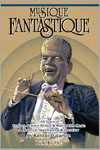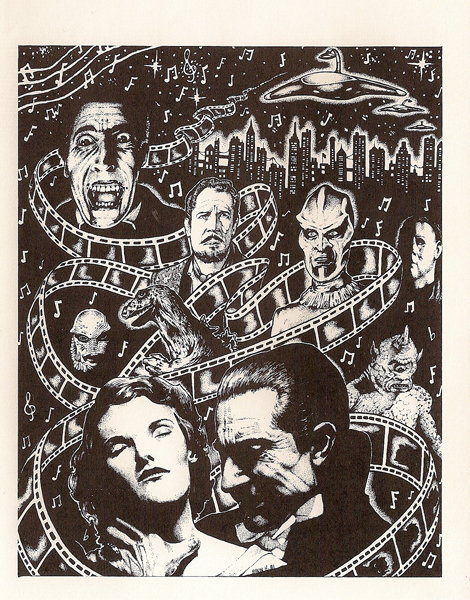December 17, 2021
MOTHER/ANDROID – An Interview with Composers Michelle Birsky & Kevin Olken Henthorn
Most recently known for scoring MOTHER/ANDROID, a Miramax and Hulu film by Mattson Tomlin, co-produced by Matt Reeves (THE BATMAN), and starring Chloe Grace Moretz, Algee Smith, and Raúl Castillo, Michelle Birsky and Kevin Henthorn are a soon to be married composing duo based in Los Angeles. Their music is contemporary and emotional, often incorporating found sounds and vocals, with influences from both classical composers and folk/pop musicians alike.
With years spent in the New York indie music scene, Michelle and Kevin bring a unique perspective to composition, drawing inspiration from composers like Trent Reznor, Atticus Ross, and Nicholas Britell, as well as songwriters like Angel Olsen, Bon Iver, St. Vincent, and Bill Callahan. Michelle, a vocalist, producer, and electronic musician, and Kevin, an accomplished guitarist and vocalist, bridge their talents into a cohesive, well-rounded entity that creates emotionally-driven, electro-acoustic music.
In 2018, Michelle composed the score for GIRL TALK, a short film by Erica Rose, which went on to receive accolades from over twenty film festivals. In 2019, Michelle and Kevin teamed up to score ASKING FOR IT, a feature film starring Stephanie Hsu and Janeane Garofalo, which premiered at Cinequest 2020 and Fuse TV.
When the pandemic hit in March 2020, the pair decided to take the leap and move from NY to LA to focus on film composing, and soon were brought on to score MOTHER/ANDROID, which premieres today on Hulu. Together, through their music, Michelle and Kevin seek to help tell stories that broaden minds, raise the female voice, and find truth and beauty in human life.

Set in the near future, MOTHER/ANDROID follows Georgia (Chloë Grace Moretz) and her boyfriend Sam (Algee Smith) through their treacherous journey of escape as their country is caught in an unexpected war with artificial intelligence. Days away from the arrival of their first child, they must face No Man’s Land – a stronghold of the android uprising, in hopes of reaching safety before giving birth.
Watch the trailer to MOTHER/ANDROID:
Q: The two of you are fairly new to film scoring – what are your backgrounds in music and what prepared you / prompted you into getting involved in scoring MOTHER/ANDROID?
Michelle Birsky: I went to college for music. It was like a general music degree and I studied composition and songwriting. I interned for Elliot Goldenthal in New York when I graduated, so I was sort of going down that route and then got distracted by the New York indie band scene and started a synthpop project called Birch, which I put all of my focus in for a few years. After a few years into living in New York I started getting asked by friends and friends of friends to score their indie shorts and indie projects, so I started scoring in that way. Then Kevin and I actually scored an indie feature together called ASKING FOR IT back in 2019, and that sort of set the wheels in motion to take this seriously. Then we moved out to L.A. and MOTHER/ANDROID happened. But Kevin came at it from a very different angle.
Kevin Olken Henthorn: I came at it from the film school angle. I’d been playing guitar since I was 9, so music was always pretty important for me. Lots of bands, growing up. I ended up going to film school and that’s actually where I met Mattson, the director. We became close friends and over the years he’s just been so supportive of my music and Michelle’s music, and when it came time for him to do his first big film he reached out to us. We pitched a lot of cues, based off the script, and ended up getting it.
Q: Have either of you been fans of the science fiction genre? What prepared you for creating music for this particular film within this genre?
Kevin Olken Henthorn: I love sci-fi. I like horror, but sci-fi is really up my alley. It’s always been a really inspiring genre for me.
Michelle Birsky: To prepare for this film, because we know Mattson so well, we sort of thought about all of his favorite movies, watched them all in a very short period of time, and listened to all the scores and got really into it. Then we took that knowledge and applied it to his script. The first ten cues that we sent him off the bat were not what he wanted, because we were going orchestral, we were going big, we were trying to mimic these other scores that we knew he liked. He turned to us after those first cues, and he said “You know what? I want something intimate. I don’t want to score the big sci-fi scenes, I want to score the relationship between the main characters, so it should sound like two people banging on pots and pans in a room and it should sound really organic and small.” So we completely re-approached it through that lens and that’s what we ended up with.
Kevin Olken Henthorn: We took it very literally and we used a lot of pots and pans!
Michelle Birsky: Yeah, we sampled actual pots and pans!
Q: With that in mind, how did you develop that palette into your film score?
Kevin Olken Henthorn: With a lot of our initial exploratory findings in scoring to the script and a lot of the takes that we did we were able to sample a lot of stuff, so when it came time to actually score the film, not only were we writing brand new music for that picture but we also had a lot of samples to blend in and make beats from. I loved that because I’m a video editor, so I can sit at a computer for long time and OCD brain-out a pattern! I love that type of work.
Michelle Birsky: Another thing we did for this one was, we thought about the two main characters in the film and the reality in which they were living: they’re stuck in the woods, they’re sneaking around, they’re hiding from something, and they are carrying two backpacks and that’s all they have. And so we thought about what kind of music could they have made? What would they have access to? So we used a lot of organic sounds, a lot of wood, like striking wood to create beats and using guitar and a lot of vocals. Kevin bowed a lot of guitar as well as using small acoustic instruments in new ways, just to reflect what it would be like to be in this kind of post-apocalyptic era.
Q: Was any of your music treated like a motif or a theme, so to speak, for these characters, or how did you deal with using repetitive treatments, musically?
Michelle Birsky: We’d thought about motifs for each character, and because it is about a couple and one is a man and one is a woman. I kind of took the female character and Kevin took the male character, which was really interesting. There was a theme which we called the Georgia Theme that comes back a few times. We also have a theme for their unborn child. We used a lot of character motifs.
Q: The film has to do with a young couple facing a war with androids that possess artificial intelligence. How did your own personal experience of moving cross-country during the COVID-19 pandemic reflect the journey of Georgia and Sam in the film?
Kevin Olken Henthorn: That was great timing! It was a pretty wild time to decide to move from a place where we had lived for seven or eight years, so we were definitely living this transient lifestyle, and to get an opportunity to go into these characters and their reality, that felt really perfect for time and place. Like this was the script we were working on. It was pretty wild.
Michelle Birsky: And things felt very apocalyptic at that time, too. Back in March 2020 we were in New York and we looked at each other and realized we can’t stay here. It felt really dangerous at the time. We ended up moving up to Vermont for a couple of months, but we had decided we were going to move to L.A. anyway, so this just expedited the process. We ended up selling most of our stuff, packing everything into a car and driving cross country.
Kevin Olken Henthorn: A big part of it was the money thing. All the work shut down in New York, so we had to get realistic.
Michelle Birsky: It was an interesting time. It felt that for this opportunity to come about during that time was pretty amazing.
Q: What elements of the film were most important to be accentuated in the score, and how did you develop your music along those lines?
Michelle Birsky: I think the emotion between the two main characters was probably the most important thing that Mattson wanted us to focus on. I used my voice a lot in creating the music, especially for the character of Georgia and her motif. I think it was important to accent this feeling of despair [that she had]. There is an element of just war-torn darkness but the main character is pregnant and she is trying to do everything she can to keep her unborn child safe. So there is an element of hope in that deep darkness and I think that’s what the main characters are focused on throughout the film – the hope of this baby who’s going to be brought into the world any day now, so using a lot of vocals and a lot of acoustic guitar and piano to accent the softness within this dark, dark traumatic film is something that we were both leaning into.
Kevin Olken Henthorn: I think a lot of it was focusing on their relationship, and that really led each scene and what they were going through.
Q: I’m interested in your use of finding things in the woods, tying in with the landscape the characters are journeying through, and using those found sounds and non-instruments and voices in creating the kind of mood to fit the film’s settings and situation. What can you tell me about that in a little more detail?
Kevin Olken Henthorn: I just love using found sounds. I wish more scores did it because I love the blend between the scene and the music. We were scoring a scene that involved a bunch of drones, and we just dove into that. It can sometimes get a little sound effects-y, but what I love about playing into it is that I feel it intensifies the scene and grounds it in a different way that isn’t always just purely musical.
Michelle Birsky: A lot of the movie takes place in the woods, and so using sort of wood-y sounds was something we did a lot. We didn’t go knock on trees, but we used some wooden pieces of furniture in our house and experimented with these different sounds – like what would the trees sound like? The other thing was, like I mentioned before, using just pots and pans. That was one of the first things we did, partially because we were staying in Arizona at the time and we didn’t really have a music studio set up and we were trying to create a bunch of demos for Mattson. He had told us that he wanted it to be intimate, he wanted it to sound like two people banging on pots and pans, so we literally recorded my parent’s pots and pans. We sampled all of these different sounds, we sampled the ticking of the toaster oven, and at one point we actually sampled a teapot! It worked perfectly because the main characters, literally that would be all they would have to make music. They have a couple pans that they heat over a fire outside. So, again, going back to the characters and thinking about what would they have access to, and how can we use the sounds that they would have access to, to further accentuate their storyline.
Q: That’s an interesting concept, the idea of the characters you’re portraying as they go through this situation and dealing with them more directly, musically. Rather than having music that wafts through the scene as underscore, here you’re using very specific music to identify with what these characters would do if they wee actually making music in the middle of this situation they’re in.
Michelle Birsky: Yeah, definitely.
Kevin Olken Henthorn: In doing that approach, the space is much smaller. You feel like you’re really just within their story, and that’s what the film felt like.
Q: The film is predominantly science fiction but I understand there’s going to be elements of horror as they’re trying to deal with these androids as well. How did you create the tension or the horrific aspect of the story when it needed it?
Kevin Olken Henthorn: Our initial approach with a lot of the android stuff was trying to take organic sounds and computerize them in some fashion. One of the first things we did was, I’d play a lot of loops with guitar. So we created a bed of ambient loops and we set it through a pitch shifter, it’s a pedal that had a wah function and you can change different parameters on it so you can create a melody line by just playing knobs. That was our initial approach, basically going in the opposite direction, instead of pots and pans and acoustic things, on the android side of things we really leaned into electrifying anything that could have been human made…
Michelle Birsky: The same with vocals. We would take vocals, oohs and ahs, and then pitch then down or up with the pitcher in order to make a human sound sound not quite human, which reflected the characters of the androids, because the androids in this film look human until you realize that they’re computers on the inside.
Q: What was most challenging for you about scoring this film?
Michelle Birsky: I think it was just the amount of material that we had to create to find the right sound. Working with Mattson was a dream, we are so on the same page and instinct in a lot of different ways, and there were just a couple of cues, like with any movie, where we…
Kevin Olken Henthorn: …tried to find it.
Michelle Birsky: Yeah. We, tried to find the right thing, and so writing more versions of something was part of the process.
Kevin Olken Henthorn: And when you land it you’re like, oh my God, that’s it. It fits like a glove!
Michelle Birsky: I think about the amount of work that it takes to score something at this level. It was new to us but it as also incredibly exciting.
Q: Where do you hope the experience with this film will take you?
Kevin Olken Henthorn: More and more scoring. That’s where we see our lives right now.
Michelle Birsky: We’re focused on doing more film and TV; we’re super interested in that. So we’re hoping just to keep going and build momentum and keep working in, not just dark sci-fi, but also the world of drama.
Q: Do you have any advice based on your experience here to give to other would-be film composers?
Kevin Olken Henthorn: Yes. My advice would be that you don’t need a music studio for anything, or hardly anything, unless you’re recording a quartet or an orchestra or strings. I feel like you really can do music anywhere. Often young musicians starting out get really daunted by the fact that “I don’t have this thing,” or “I don’t have a proper set up” – and you just don’t need that. All you need is a creative inspiration – and maybe some pots and pans!
Michelle Birsky: And a good microphone! For us, I feel like in the beginning of this, the second we were brought onto the project, it was scary. It was daunting. Our motto kind of became “whatever it takes to get the job done.” That’s what I kept saying, over and over. So I think, as daunting as it can be to score something of this capacity, it’s one step at a time and, again, as Kevin mentioned, we used a lot of bizarre sounds that not a lot of film composers would do. That’s not the most serious way of doing things, but I think it just goes to show that you can create music in a lot of different ways using different techniques.
Special thanks to Andrew Krop and Kyrie Hood of White Bear PR for facilitating this interview.
For more information on the composers, see their website here https://birsky-henthorn.com/.










